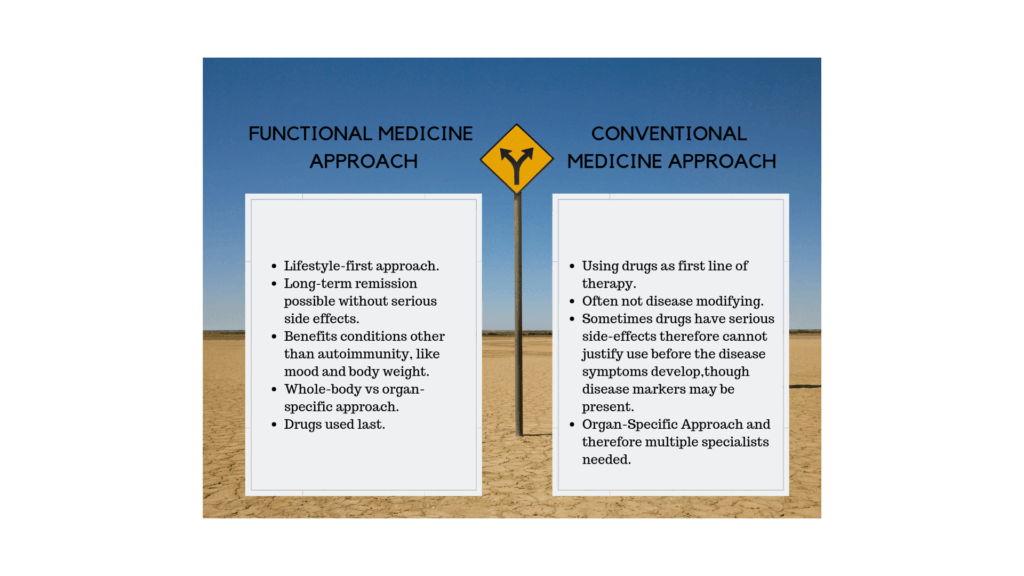(This post was previously published on my old website April 2019. Updated September 2019)
This is how a conversation with me goes. “Dr. Kar, I have been diagnosed with Multiple Sclerosis by my Neurologist ……..at (name of some well-known hospital ) and I have been recommended ……….(name of medicine). I have researched on the internet and found out that MS is not curable and I will need long-term treatment. I have profound fatigue and my doctor says that is a part of my disease and nothing much can be done about it. However, I also found out that many people have benefited by Functional Medicine treatment. I want to know what else I can do to feel better”.
My perspective is that of a Functional Medicine doctor. My modalities of treatment fall in the category of “what else I can do to feel better”.Can I help you “cure” your disease? It depends on your definition of cure! Can I help you reach NEDA (No Evidence of Disease Activity)? Quite possible! I am not an alternative medicine practitioner. My perspective is that of a practitioner of Western Medicine who uses science to back up recommendations. This goes beyond using ONLY prescription drugs. I am not against the use of prescription drugs, but very often many of you are unable to continue the medications, either because of the cost or because of side effects from the drugs. Or you may have early symptoms that do not justify the use of potentially toxic medicines. In such a situation what else can you do?
What Is Multiple Sclerosis?
Multiple Sclerosis (MS) is an autoimmune disorder of the nervous system, where your immune system attacks the fat layer around your nerves (myelin) in the brain and spinal cord. It is an inflammatory disease and causes loss of function of nerves from an autoimmune process which attacks the myelin layer of your nerves. This results in nerve signals from your brain not reaching parts of your body normally, resulting in tingling, numbness, and difficulty in movement along with a host of other symptoms.
Symptoms Of Multiple Sclerosis
Many symptoms of MS may come and go in a paroxysmal way. However, fleeting symptoms do not necessarily mean a benign course of the disease.
- Stabbing or burning sensations down the side of your face. Some people have noticed this symptom many years before being diagnosed as MS.
- Itching, numbness, tingling, burning or aching of skin
- Shooting pain in limbs
- A sensation of electric shock down your neck and spine.
- Blurred vision or double vision. In fact, sometimes you may have gone to your eye specialist with this complaint and you were not referred to a Neurologist to rule out MS after an eye exam was found to be normal. This is one reason for delayed diagnosis.
- Eye pain
- Slurring of speech.
- A Sudden tightening of limb, twitching of leg, numbness.
- Spasms of face or trunk muscles.
- Difficulty swallowing
- Weakness and unsteadiness or fall
- Lack of coordination.
- Fatigue
- Heat intolerance
- Sexual dysfunction
- Cognitive decline. Memory loss, difficulty with complex tasks, lack of attention.
- Depression
- Poor job performance
- Poor decision making
What Are The Different Types of Multiple Sclerosis?
- Relapsing-Remitting MS (RRMS): This is the commonest form. People with RRMS have temporary respite, then flare-ups or relapses occur.
- Secondary-Progressive MS (SPMS): Symptoms worsen over time. Most people with RRMS progress to SPMS.
- Primary-Progressive MS (PPMS).PPMS is characterized by gradually worsening symptoms from the beginning, with no relapses or remissions.
- Progressive-Relapsing MS (PRMS). This is a type of MS where there is a steady worsening of the disease with acute relapses, but no remissions.
Symptoms of MS may start many years before the diagnosis.
Multiple Sclerosis symptoms may occur suddenly, showing up for about a day or so, then be asymptomatic for many years or symptoms may worsen progressively over time with no remission in between. This study ((1))showed that people had symptoms up to 10 years before a diagnosis of MS was made. This period of time when there are symptoms, but a definitive diagnosis hasn’t been made is called the prodromal phase. It is much like the feeling you have before experiencing a cold or flu; you have ‘itching sensation” at the back of the throat or a feeling of being unwell. You know that you have to brace yourself for the sneezing and fever which will soon follow.
What are some of the symptoms people had experienced?
- ill-defined symptoms and signs
- fibromyalgia
- bowel disturbances, like IBS
- mood and anxiety disorders
- depression
- insomnia
- fatigue
- headache, migraine
- various types of pain. Feeling of “lightning sensation” on the face or arms.
Many of these people had visited multiple specialists, including neurologists and neurosurgeons and psychiatrists. The important point is even if their doctors had suspected MS, their symptoms didn’t justify starting a prescription medication for MS. This is where Functional Medicine has a unique advantage. We focus on lifestyle first, before adding prescription medications.

Fatigue in MS
75-80% of people with MS complain of fatigue. ((2))This is described as a lack of energy for mental and/or physical activity or sense of exhaustion or profound tiredness. In fact, in many people, fatigue can get in the way of their day-to-day activity to the point that they have to give up working!
Why does fatigue occur: Though the exact cause of fatigue in MS is not known but it may be because of the inflammatory process itself. Some of the other mechanisms may involve brain structure and network abnormalities or an imbalance in dopamine metabolism. Depression, sleep disorders, muscle pain and spasms, bladder dysfunction, urinary infections are sometimes associated with fatigue in MS.
Other Causes of Fatigue to be Ruled Out:
- Micronutrient deficiencies
- Anemia
- Thyroid dysfunction
- Medication side effects
- Sleep apnoea
How To Deal With Fatigue in MS
Fatigue in MS needs a multi-pronged attack. Most medications for the treatment of MS have very little effect on fatigue.
- Food
- Exercise
- Nutritional supplements
- Drugs
Food:
MS is a neuroinflammatory disease. Therefore an anti-inflammatory diet is one of the best options for you. In an article ((3)) co-authored by Dr. Terry Wahls, they used a nutrient-dense anti-inflammatory diet (along with home exercise program, massage therapy, neuromuscular stimulation, mindfulness) and tracked the level of fatigue in people with MS. They followed them for 1 year and found that those who followed their program had less fatigue than when they started.
What did they eat?
- Green-leafy vegetables- 3 cups cooked or 6 cups raw
- Sulphur-rich vegetables
- Omega 3 oils
- Plant protein
- Animal protein
- Kelp
- Spirulina
- Nutritional yeast
What did they avoid eating?
- Gluten-containing grains
- Dairy products
- Eggs
- Sugar
- Processed food
Does Intermittent Fasting Help in MS?
Intermittent fasting (IF) or Time Restricted Eating (TRE) is eating within a shortened interval of time. The shortest interval is 12 hours of not eating food overnight. Though TRE/IF has been studied in many conditions, it has not been clinically tested in people with MS. However, a Fasting Mimicking Diet (FMD), where you eat about 500 calories a day of proprietary preparations for 5 days in a month, for at least 3 months.Dr.Valter Longo from Professor of Gerontology at the University of Southern California has done extensive studies on FMD. In a small feasibility study ((4))people with MS felt better on FMD.
Ketogenic Diet in MS
A ketogenic diet is one that contains <20 grams of carbohydrates a day along with moderate protein and good quality fat. When you eat less carbohydrates, your body starts utilizing your body fat stores as fuel instead of the carbohydrates coming from food. This not only helps in fat loss, but it also has benefits in reducing inflammation, improves brain function and metabolism. In a small study ((5))on 20 people with relapsing-remitting MS, those on a modified Atkins diet followed for 6 months, had less depression and fatigue and lost weight as well. A modified Atkins diet is a low carbohydrate ketogenic diet.
Exercise:
Though exercise is a beneficial strategy for people with multiple sclerosis, very few people with MS exercise. Why is that so?
- They do not feel like exercising. Profound fatigue can definitely get in the way of exercise.
- Some people are afraid to exercise because they think it will worsen the disease!
- Their doctor has not recommended it!
What can exercise do for you?
- Relieve symptoms.
- Restore function
- Improve fatigue
- Promote wellness
- Reduce depression
- Better bowel and bladder function
What type of exercise should you do?
Studies have shown almost all types of exercise can help in MS, from pilates, weight training, yoga, stretching. Exercise doesn’t have to be vigorous to be beneficial! You can start with simple chair exercises ((6)), gardening, cooking, walking or stretching.
Nutritional Supplements:
Melatonin:
Melatonin is a substance naturally produced by the pineal gland in your body. It is produced during the day and released at night. Therefore exposure to artificial light during the evenings can affect the release of melatonin. Melatonin is related to the biological clock(Circadian Rhythm) in the body , which in turn is related to your metabolism and immune system functions.
In fact a large number of genes in your body are influenced by the Circadian Rhythm.MS disease activity is higher in spring and summer than in winter. In countries like Canada (which has one of the highest incidence of MS in the world), days can be very long in spring and summer versus in winter. It is possible that melatonin levels influence the seasonal relapse of MS.A study measuring melatonin metabolites in urine in people with MS found that lower levels of melatonin were related to worse MS symptoms.
Will a melatonin supplement help? One study ((7))using 5 milligram of melatonin at bedtime for 90 days showed improved sleep and antioxidant status. However, it is worthwhile trying to increase melatonin levels naturally AND adding a supplement.
Coenzyme Q10:
CoQ10 is a substance naturally found in your body. With age levels of natural CoQ10 reduce. Some medications like statins (cholesterol lowering medicines) may reduce your levels of CoQ10.One of the main functions of CoQ10 is in helping your cells produce energy.Supplements of CoQ10 are generally considered safe.
In a study((8)) they used 500 mg of supplemental CoQ10 in people with MS and followed for 12 weeks.Those people on CoQ10 experienced improvement in fatigue and depression.
Drugs:
Amantadine is approved for fatigue in MS, but the efficacy is not well documented. Another drug, Modafinil is frequently used but its efficacy is doubtful. ((9)) ((10))
Have You Been Screened For Cognitive Decline?
Cognitive impairment is a known challenge in people with MS. Some of the symptoms of cognitive decline may be present upto 2-20 years before you develop the disease symptoms! However, many of you have not been evaluated for cognitive decline. Problems with cognition may occur in people with mild as well as severe symptoms. The longer you have the disease the higher the risk.
What are the symptoms of cognitive decline?
- Difficulty in learning something new
- Difficulty remembering things
- Poor decision making. This affects your long-term symptom control.
- “Brain fog”
- Poor performance review at work
- Difficulty holding a job
- Mood issues
- Family members may notice changes in you.
Major Multiple Sclerosis Societies from around the world have issued guidelines for cognitive screening.Their recommendation is a minimum screening for cognitive function at the time of diagnosis and subsequently every year , using validated tools like the Symbol Digit Modalities Test. Some of these tools are free, some may need a payment.Your Neurologist will know which one to choose.
I use a simple question during the consultation.”Do you feel that your brain is not as rapid fire as it was before?“In nine out of 10 cases I see a gentle nod or sometimes a family member nods vigorously, almost like I have validated something that they have suspected for a while!
What is the solution: This will need a multi-pronged approach.Some of the areas I focus on are
- Sleep
- Food
- Exercise
- Targeted Supplementation
- Mind-Body Interventions like mindfulness, meditation, yoga
Bottomline
- MS symptoms may appear many years before a definitive diagnosis. During the period of prodromal symptoms, the use of prescription drugs cannot be justified. But a Functional Medicine approach starts with lifestyle first.
- Fatigue in MS is very common. Dietary interventions, exercise, and few supplements can help. Prescription drugs do not help much with fatigue in MS


